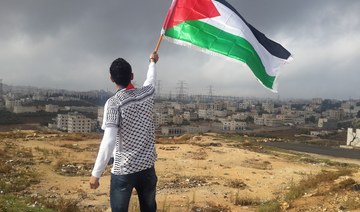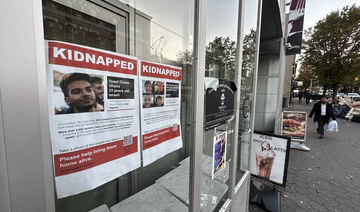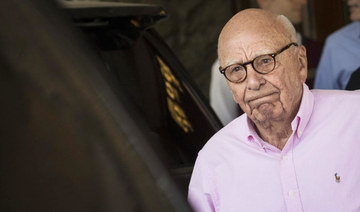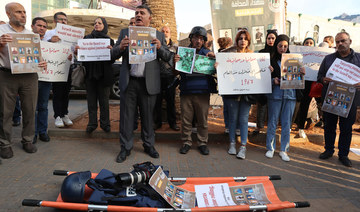LONDON: More than 1,300 artists, including Academy Award winner Olivia Colman and BAFTA winners Aimee Lou Wood and Siobhan McSweeney, signed an open letter on Thursday accusing cultural institutions across Western countries of “repressing, silencing and stigmatizing Palestinian voices and perspectives.”
This includes “targeting and threatening the livelihoods of artists and arts workers who express solidarity with Palestinians, as well as cancelling performances, screenings, talks, exhibitions and book launches,” they said in the letter.
“Despite this pressure, artists in their thousands are following their conscience and continuing to speak out. Freedom of expression, as enshrined in the Human Rights Act and the European Convention of Human Rights, is the backbone of our creative lives, and fundamental to democracy.”
The letter cites several examples of censorship such as Lisson Gallery’s so-called postponement of a London exhibition by Ai Weiwei, Folkwang Museum’s last-minute cancellation of Anais Duplan’s Afrofuturism exhibition, as well as Saarland Museum’s cancellation of Candida Brietz’s solo exhibition in Germany.
In addition, Hollywood producers announced their decision to remove actress Melissa Barrero from “Scream VII.”
In every instance, the organization stated that the reason for the cancellation was the artists’ support for Palestine, which is unrelated to their professional work.
Last month, the publicly funded Arnolfini, an international arts center and gallery in Bristol, decided not to hold film and spoken word poetry events organized by the Bristol Palestine Film Festival, due to claims the events might “stray into political activity.”
The events have since been moved to other venues in the city.
Letter signatory Hassan Abulrazzak, whose play “And Here I Am” is based on the life of a Palestinian actor, was canceled in Paris in October.
He said: “This censorship is as frustrating as it is wrongheaded. Now is the time to listen to Palestinians, to understand what their lives are like.”
Film directors Emma Seligman, Hany Abu-Assad and Ken Loach, among many others, urged arts organizations to join calls for a permanent ceasefire and to “stand up for artists and workers who voice their support for Palestinian rights.”
They accused arts organizations of a “disturbing double standard,” saying that “expressions of solidarity readily offered to other peoples facing brutal oppression have not been extended to Palestinians.”
The letter calls on the arts and culture sector to publicly demand a permanent ceasefire, promote and amplify the voices of Palestinian artists, writers, and thinkers, stand up for artists and workers who voice their support for Palestinian rights and refuse collaborations with institutions or bodies that are complicit in severe human rights violations.
Award-winning composer Jocelyn Pook, Robert del Naja, David Sylvian and many others said they “stand in solidarity with those facing threats and intimidation in the workplace.”
They went on to warn that “many artists are refusing to work with institutions that fail to meet (these) basic obligations” to uphold freedom of expression and anti-discrimination when it comes to speech on Palestine.
Two thousand poets announced a boycott of the Poetry Foundation in the US after its magazine refused to publish a book review it had commissioned.
Artforum magazine is also facing significant backlash as artists and writers from around the world express their refusal to collaborate with the publication.
Additionally, its editorial team has stepped down in protest following the dismissal of editor David Velasco, who had published a letter signed by 8,000 artists that called for a ceasefire and for “Palestinian liberation.”
Last Friday, UN experts said in a statement: “People have the right to express solidarity with victims of grave human rights violations and demand justice, whether from one side or the other or both.”
They added: “Some artists have been deprogrammed and censored for calling for peace, others have lost their jobs, and some artists have been silenced or side-lined by their own cultural organizations and artistic communities.”






























